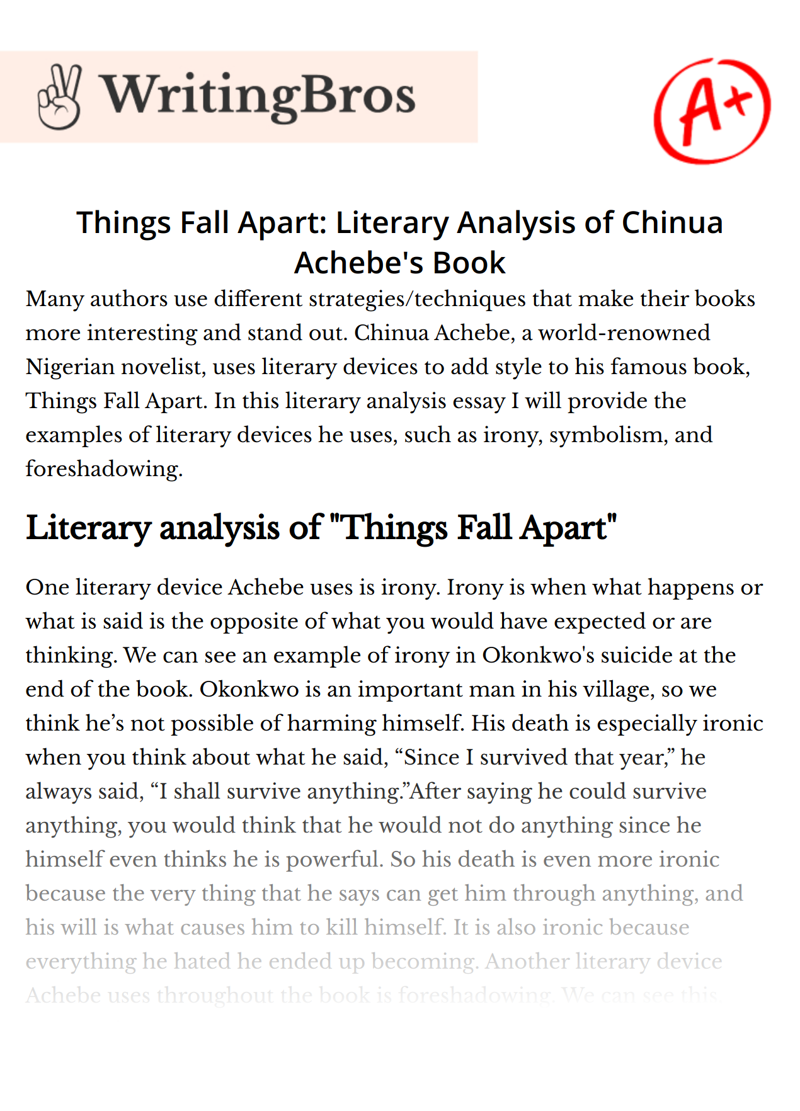Things Fall Apart: Literary Analysis of Chinua Achebe's Book

Many authors use different strategies/techniques that make their books more interesting and stand out. Chinua Achebe, a world-renowned Nigerian novelist, uses literary devices to add style to his famous book, Things Fall Apart. In this literary analysis essay I will provide the examples of literary devices he uses, such as irony, symbolism, and foreshadowing.
Literary analysis of "Things Fall Apart"
One literary device Achebe uses is irony. Irony is when what happens or what is said is the opposite of what you would have expected or are thinking. We can see an example of irony in Okonkwo's suicide at the end of the book. Okonkwo is an important man in his village, so we think he’s not possible of harming himself. His death is especially ironic when you think about what he said, “Since I survived that year,” he always said, “I shall survive anything.”After saying he could survive anything, you would think that he would not do anything since he himself even thinks he is powerful. So his death is even more ironic because the very thing that he says can get him through anything, and his will is what causes him to kill himself. It is also ironic because everything he hated he ended up becoming.
Another literary device Achebe uses throughout the book is foreshadowing. We can see this, once again, when Okonkwo dies. Foreshadowing is when an event or action hints at the future. In this case, foreshadowing occurs when Okonkwo is exiled for accidentally killing a clansman. He could not handle this change and falls into depression. His family helps to bring him out of it, but it shows that he does not handle change well. This event and Okonkwo’s actions foreshadow his death later; it shows us that, despite what he says about surviving anything, he can’t deal with change, and becomes depressed.
Symbolism will be the last example of literary devices. In the book, we see symbols of masculinity and femininity. Others we see are yams and fire. Okonkwo is associated with burning, fire, and flame throughout the book. The problem with fire, as Okonkwo acknowledges that fire destroys everything it consumes. Just as fire feeds on itself until all that is left is a pile of ash. Fire symbolizes potential, masculinity, and life. Yam is referred as a “man’s crop”. Yams is a major symbol of masculinity. There are also “women crops”, such as cocoa-yams and melons which these symbolize femininity.
Chinua Achebe, uses more literary devices than these but these specific strategies, such as, irony, foreshadowing, and symbolism, are some of the ones we can see throughout the book. Giving the book these certain details, brings clarity to the text and helps us imagine the scenes that are going on in any story.
Another important literary device used in Things Fall Apart is the theme of cultural clash. Throughout the book, Achebe presents the cultural clash between the Igbo people and the Europeans who come to colonize their land. This clash of cultures creates tension and conflict that ultimately leads to the downfall of Okonkwo and his community. Achebe shows the Europeans as outsiders who do not understand the Igbo culture and traditions, and who impose their own beliefs and values on the Igbo people. This clash is seen most prominently in the character of Reverend Smith, who is intolerant of the Igbo customs and seeks to convert the villagers to Christianity. The clash of cultures in the book highlights the destructive nature of colonialism and the importance of preserving cultural traditions.
In addition, Achebe also uses the narrative style of storytelling to add depth and meaning to the book. The book is written in a third-person omniscient narrative style, which allows the reader to see the thoughts and feelings of multiple characters. This narrative style gives the reader a more complete picture of the story and allows them to see the events from different perspectives. Achebe also uses traditional African storytelling techniques such as proverbs and oral histories to add authenticity to the book. The use of storytelling is an important part of Igbo culture, and Achebe’s use of it in the book helps to preserve and honor this cultural tradition.
Overall, Achebe’s use of literary devices, narrative style, and cultural themes in Things Fall Apart make it a powerful and thought-provoking work of literature that has had a lasting impact on readers around the world.
References
- Achebe, C. (1958). Things Fall Apart. Heinemann.
- Emenyonu, E. (1997). Chinua Achebe: A Biography. Indiana University Press.
- Innes, C. L. (1990). Chinua Achebe. Cambridge University Press.
- Irele, A. (1980). The African Experience in Literature and Ideology. Heinemann.
- Nwosu, C. (2007). A Study Guide to Chinua Achebe's Things Fall Apart. African Heritage Press.
- Ogude, S. (2015). Chinua Achebe: The Man and His Works. Malthouse Press Limited.
- Ohaeto, K. (1990). Chinua Achebe: New Perspectives. African World Press.
Cite this Essay
To export a reference to this article please select a referencing style below

